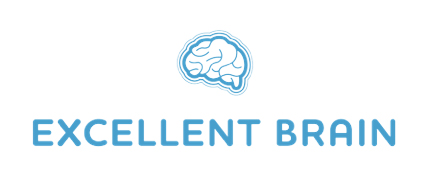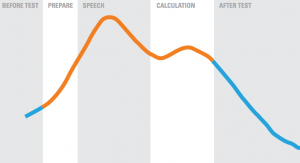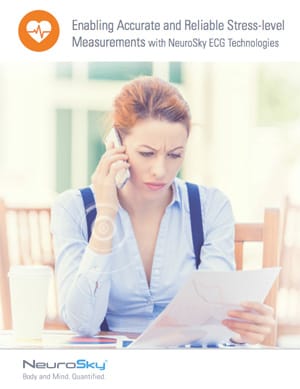Being aware of what triggers stress and how to combat those triggers is one of the most important things a person can do to live a healthier lifestyle. Stress is not something that anyone can live without, but it is something that can be managed through the interpretation of quantifiable data obtained from wearable and mobile devices enabled by NeuroSky’s ECG sensors and algorithms. In this piece, we’re going to focus on ECG sensors and algorithms and how they interpret data to become a reliable and meaningful indicator of stress.
How to Track Stress
Throughout the years there have been numerous scientific studies that indicate that heart rate (HR) as well as heart rate variability (HRV) data can be strong indicators of stress. This data is achieved thorough ECG readings. There was a time when these readings were relegated to being taken in a doctor’s office or other controlled environment; but advancements in technology, such as NeuroSky’s ECG biosensors, have given rise to wearable devices that can be used to track your HR and HRV nearly anywhere. These ECG-based biosensors are able to accurately calculate HR and HRV using short duration intervals which are then interpreted by NeuroSky’s stress algorithms.
Putting the Stress Algorithm to the Test
NeuroSky’s stress algorithms have gone through rigorous standardized experiments in order to validate their effectiveness, including the Trier Social Stress Test (TSST). This test consists of delivering a public speech and doing mental arithmetic calculations afterwards. During the test, cortisol measurements were taken at various stages as indicators of stress. Results of the cortisol measurements were plotted in the graph below and indicated rising stress levels leading up to and during the public speech and mental calculation, followed by lower stress levels after the tasks were completed. NeuroSky’s algorithm correlates very closely to the behavior plotted on the graph of the TSST experiment, lending credence to its ability to effectively track stress.
Figure 2: A typical stress response during a TSST experiment
How ECG Sensors & Algorithms Track Stress
In order to be effective, ECG sensors and algorithms need a baseline so a user’s increasing and decreasing levels of stress can be tracked in relation to that baseline. This baseline is obtained through the input of some basic data such as the user’s age and sex. After this data is inputted, the ECG sensor needs to record its first reading. This is best done when the user is in a low stress or no stress situation. A situation that is often cited as being the best time to obtain this measurement is when the user first wakes up in the morning. After a few readings from the ECG sensor, the algorithm starts to adapt intelligently and can begin supplying the user with data related to high stress and low stress situations.
The data obtained throughout the day by a wearable or mobile device enabled by ECG sensors and algorithms can assist the user in better understanding how diet and exercise can affect their stress levels, as well as indicate what environmental elements may be causing an increase in stress. From here, a user can make adjustments to their lifestyle in order to remove some stressors from their lives, as well as better manage the ones that remain.
For more information on creating wearable and mobile devices that quantify stress with ECG sensors and algorithms, download the free whitepaper, Enabling Accurate and Reliable Stress-level Measurements with ECG Technologies.




